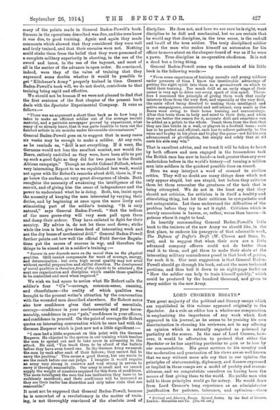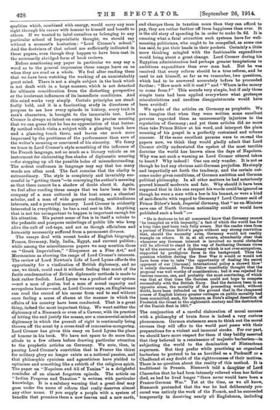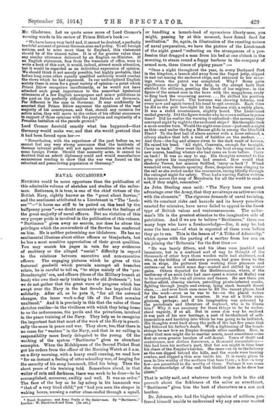LORD CROMER'S ESSAYS" Tax great majority of the political and
literary essays which are republished in this volume appeared originally in the Spectator. As a rule ail editor has a wholesome compunction in emphasizing the importance of any work which first appeared in his journal, as he seems to be praising his own discrimination in choosing his reviewers, not to say offering an opinion which is naturally regarded as poisoned by partiality at the source. In the case of Lord Cromer, how- ever, it would be affectation to pretend that either the Spectator or he has anything particular to gain or to lose by our commendation. His great services to his country and the moderation and penetration of hie views are so well known that we may without more ado say that in our opinion the principles of statesmanship, diplomacy, and finance expressed or implied in these essays are a model of probity and reason- ableness, and we congratulate ourselves on having been the means of first giving them to the world. No public man who held to these principles could go far astray. He would draw from Lord Cromer's long experience as an administrator justification for patience, tolerance, and optimism—three
• Political and Literary Essays. Second Series. By the Earl of Cromer. London: Macmillan and Co. [10s. Cd. net]
qualities which, combined with energy, would carry any man right through his career with honour to himself and benefit to others. If we wanted to label ourselves as belonging to any particular school of Imperialistic thought, we should say without a moment's hesitation : "Lord Cromer's school." And the doctrines of that school are sufficiently indicated in these papers, even though they happen to have been cast in the necessarily abridged form of book reviews.
Before mentioning any paper in particular we may say a word as to the general impression these essays leave on us when they are read as a whole. We feel after reading them that we have been watching the working of an unmistakably great mind. There is not a single subject in the book which is not dealt with in a large manner, which is not detached for ultimate consideration from the distorting perspective or the irrelevant influences of its immediate conditions. And this mind works very simply. Certain principles are stead- fastly held, and it is a fascinating study in directness of purpose to see how every episode in history, every trait in men's characters, is brought to the immutable test. Lord Cromer is always so intent on conveying his precise meaning that we can guess that he has no appreciation of that butter- fly method which visits a subject with a glancing touch here and a glancing touch there, and leaves one much more impressed by the prettiness of the performance than sure of the writer's meaning or convinced of his sincerity. We fancy we trace in Lord Cromer's style something of the influence of the French language, not so much as a literary vehicle as an instrument for elaborating fine shades of diplomatic meaning —for stopping up all the possible holes of misunderstanding.
The ardent craftsman in language may say that too many words are often used. The fact remains that the clarity is extraordinary. The style is completely and invariably suc- cessful in " getting there "—in conveying the author's meaning so that there cannot be a shadow of doubt about it. Again.
we feel after reading these essays that we have been in the company of a man cultured in the best sense; a classical scholar, and a man of wide general reading, multitudinous interests, and a powerful memory. Lord Cromer is evidently interested in everything; he has a real zest in life. Anything that is not too unimportant to happen is important enough for his attention. His patent sense of fun is in itself a rebuke to the pedantic and pompous underlings of public life who keep alive the cult of red-tape, and act as though officialism and humanity necessarily suffered from a permanent divorce.
The essays deal with recent books of English biography, France, Germany, Italy, India, Egypt, and current politics ; while among the miscellaneous papers we may mention those on "Greek Imperialism," "Eloquence as a Fine Art," and Mormonism as showing the range of Lord Cromer's interests.
The review of Lord Newton's Life of Lord Lyons affords the opportunity for a vindication of British diplomacy, and no one, we think, could read it without feeling that much of the facile condemnation of British diplomatic methods is made to look rather foolish. Lord Lyons was a product of our system —not a man of genius, but a man of sound capacity and scrupulous honour—and, as Lord Cromer says, an Englishman can read the record of his career from end to end without once feeling a sense of shame at the manner in which the affairs of his country have been conducted. That is a great thing, indeed the most important thing. We want neither the diplomacy of a Bismarck or even of a Cavour, with its practice of letting the end justify the means, nor a commercial-minded diplomacy in which the pursuit of right is continually being thrown off the scent by a cross-trail of concession-mongering.
Lord Cromer has given this essay on Lord Lyons the place of honour in his book. We have not space to do more than allude to a few others before drawing particular attention to the prophetic articles on Germany. We note, then, in passing Lord Cromer's conviction that in France the thirst for military glory no longer exists as a national passion, and that philosophic cynicism and agnosticism have yielded to optimism and something like a rebirth of the religious spirit. The paper on "Napoleon and All of Yanina" is a delightful reminder of an almost forgotten episode. The article on "Indian Progress and Taxation" is written with particular knowledge. It is a salutary warning that a great deal may pass under the name of reform that really deserves almost any other name. If you supply a people with a system of benefits that promises them a new heaven and a new earth, and charges them in taxation more than they can afford to pay, they are rather further off from happiness than ever. It is the old story of spending 5s. in order to make 2s. 6d. It is amazing what a fatal attraction such systems have for well- meaning politicians, who ought to be compelled, as some one has said, to put their heads in their pockets. Certainly a little more thinking mingled with the fashionable expenditure would bring about a great change. Lord Cromer during his Egyptian administration had perhaps greater temptations to ambitious expenditure than ever man had. But he was resolved that every reform should be a true reform, and he used to ask himself, so far as we remember, two questions, which had to be answered accurately before he proceeded further : " How much will it cost ? " and " Where is the money to come from P" This sounds very simple, but if only these simple tests had been applied everywhere what grotesque miscalculations and needless disappointments would luive been avoided!
We spoke of the articles on Germany as prophetic. We can imagine that when they were written some excellent persons regarded them as unnecessarily injurious to the reputation of Germany ; and yet these articles did no more than take Prince Billow at his word, and interpret the plain meaning of his gospel in a perfectly restrained and urbane manner. If the same excellent persons were to re-read the papers now, we think they would gladly admit that Lord Cromer civilly understated the upshot of the most terrible doctrine the world has known since the days of Napoleon. Why was not such a warning as Lord Cromer uttered taken to heart P Why indeed ! One can only wonder. It is not as though be had any obvious anti-German prejudice. He simply and impartially set forth the tendency, and the certain out- come under given conditions, of German ambition and German political philosophy. In all other matters he had notoriously proved himself moderate and fair. Why should it have been supposed that in this one respect his words could be ignored as though he were a man with a bee in his bonnet, or were a kind of anti-Semite with regard to Germany P Lord Cromer said of Prince Billow's book, Imperial Germany, that " no ex-Minister save one of North German nationality could or would have published such a book"
"He is desirous to let all concerned know that Germany cannot be trampled on with impunity,' a fact of which the world has for a long time past been very fully aware. But the reader rises from a perusal of Prince Billow's pages without any strong conviction that, should the necessity arise, Germany would not readily trample on others. It is, at all events, abundantly clear that whenever any German interest is involved no moral obstacles will be allowed to stand in the way of furthering German views by all the resources of a diplomacy which is not over-scrupulous, supported by prodigious force in the background. Thus the question whether during the Boer War it would or would not have been wise to take the opportunity of dealing the secret opponent of our [German] international policy a shrewd blow' is calmly discussed. Prince Mow manifestly thought that the proposal was well worthy of consideration ; but it was rejected for various reasons, one, and probably the most convincing, of which was that at that time the German could not hope to compete successfully with the British Navy. Had the decision been in an opposite sense, the morality of the proceeding would, without doubt, have been defended on the ground that in the chequered course of English history greater outrages on public morality had been committed, such, for instance, as Bute's alleged desertion of Frederick the Great in the eighteenth century and the destruction of the Danish fleet in 1801:"
The conjunction of a careful elaboration of moral excuses with a philosophy of brute force is indeed a very curious phenomenon. German statesmen seem to think out the moral excuses they will offer to the world pan passe with their preparations for a violent and immoral stroke. For our part, we should have more respect for them if they baldly asserted that they believed in a renaissance of majestic barbarism—in subjecting the world to the domination of Nietzschean
supermen. But they prefer while practising an organized barbarism to pretend to be as horrified as a Peckaniff or a Chadband at any doubt of the righteousness of their motives. There is no question about the reality of this method. It is traditional in Prussia. Bismarck told a daughter of Lord Clarendon that be had been intensely relieved when her father died, as had he lived longer "there never would have been a Franco-German War." Yet at the time, as we all know, Bismarck pretended that the war he had deliberately pro- cured was entirely the work of the French, and he succeeded temporarily in deceiving nearly all Englishmen, including
Mr. Gladstone. Let us quote some more of Lord Cromer's warning words in his review of Prince Billow's book :—
"We have here a very lucid and, it cannot be doubted, a perfectly truthful account of present German aims and policy. To all foreign nations, and to none more than to England, this statement should be of the utmost value. It is of far greater value than any similar utterance delivered by an English ex-Minister. If an English statesman, free from the trammels of office, were to write a book of this sort, it would, indeed, attract much attention, but it would be regarded as an individual expression of opinion. We should think it not merely possible, but highly probable, that before long some other equally qualified authority would combat the views which he had expressed. In our undisciplined English society there is room for a great variety of opinion—a point which Prince Billow recognizes insufficiently, or he would not have attached such great importance to the somewhat hysterical utterances of a few English newspapers and minor politicians in the past on the perfectly ridiculous text Delenda est Germania. Far different is the case in Germany. It may confidently be asserted that Prince Billow expresses the opinions of the vast majority of his countrymen, and that, should any occasion for action arise, they will move to the orders of his official successors in support of those opinions with the precision and regularity of a Prussian battalion on the parade ground."
Lord Cromer foretold exactly what has happened—that Germany would make war, and that she would pretend that it had been forced upon her :—
"Nevertheless, with the experience of the past before us, we cannot feel any very strong assurance that the incidents of German internal policy will not again necessitate an attack on some foreign Power. Should that necessity arise, it cannot be doubted that an adroit diplomacy could and would manufacture occurrences tending to show that the war was forced on the reluctant and peace-loving population of Germany."




































 Previous page
Previous page